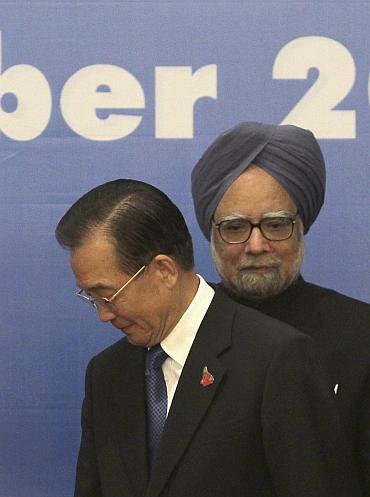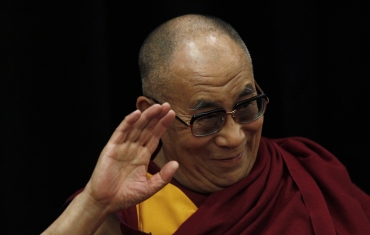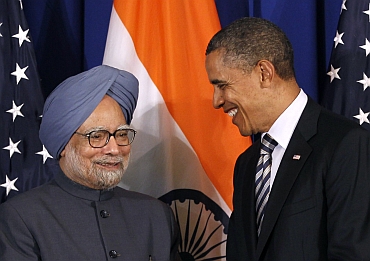 | « Back to article | Print this article |
Indo-Sino talks put off. Has Beijing been overdramatic?
Avoidable unpleasantness has recently crept into India-China relations over issues, which should not have been overdramatised by China thereby injecting a certain distrust into the relations which had been progressing well despite continuing differences over the border dispute between the two countries.
The participation of an Indian government-owned oil company in an off-shore oil/gas exploration in three blocks in the South China Sea area belonging to Vietnam sovereignty was the starting point of this unpleasantness.
Chinese official spokesmen took care to be measured in their comments on the participation of the Indian company so that the issue did not have an uncontrollably adverse effect on the bilateral relations. Similar care not to over-dramatise the Chinese unhappiness was evident in Chinese official comments after the recent meeting between Prime Ministers Manmohan Singh and his counterpart Wen Jiabao in the margins of the East Asia summit at Bali in Indonesia.
This salutary restraint was unfortunately not evident in two commentaries on Sino-Indian relations disseminated by the party-owned Global Times and the government-owned Xinhua news agency. In view the Global Times and Xinhua, it is natural that their hard-hitting comments on India were viewed by many in India as the conscious adoption of a two-edged policy by the Chinese authorities on India's relations with Vietnam and its perceived activism in the South China Sea. This two-edged policy was seen by many in India as marked by seeming official restraint and semi-official anti-Indian virulence.
Click NEXT to read further...
Chinese unhappy over Dalai Lama's participation in New Delhi Buddhist conference
The hiccups over India's firm, but gentle assertion of its right to help Vietnam in oil/gas exploration without taking a stand on the merits of the dispute between China and Vietnam over the question of sovereignty over the South China Sea islands have been aggravated by another instance of over-dramatisation by the Chinese of their objection to the proposed participation by the Dalai Lama in a global Buddhist conference being held by a non-governmental foundation at New Delhi from November 27 to 30 coinciding with the 2600th anniversary of the Enlightenment of Buddha.
It is understood that the Chinese initially objected to the participation of the Dalai Lama in the conference and subsequently to the conference itself. It so happened that the dates of the conference coincided with the 15th round of the talks on the pending border issue between the Special Representatives of the prime ministers of the two countries which was proposed to be held at New Delhi on November 28 and 29. This round has now been postponed without any fresh dates being fixed because of the reported Chinese unhappiness over the Buddhist conference and the participation of the Dalai Lama in it.
While one could argue with some reason that Chinese sensitivities could have been kept in mind while fixing the dates for the two events so that they did not clash, one would have equal reason not to appreciate the avoidable drama created by the Chinese which has not only come in the way of the 15th round of the border talks, but has also cast a shadow over the current state of the Sino-Indian relations.
Chinese media irritated with India's developing ties with Myanmar, US
While continuing to be sensitive to Chinese interests and concerns wherever possible and necessary, India has in recent months started slowly asserting its own interests and concerns without surrendering totally to those of China.
The increasing assertion of the Indian will to defend and promote its interests without impinging on those of China has been particularly evident in our relations with Vietnam and Myanmar and in our refusal to intervene in matters concerning the Dalai Lama, provided those matters are purely of a religious nature without any political significance.
This assertion of the Indian will has had two aspects -- in relation to our developing ties with Myanmar and Vietnam, and in developing our co-operation with the United States, Japan and Australia in matters relating to maritime security and maritime counter-terrorism.
While the Chinese have not so far openly come out with any objection to our developing relations with Myanmar, their officially-controlled media has been increasingly irritable with regard to our developing relations with Vietnam and the US. The Dalai Lama issue is showing signs of becoming an additional source of irritation.
China needs to pay attention to India's interests, concerns
If the Chinese really value their relations with India as they claim to be, it is important for them to pay as much attention to India's interests and concerns as we have always paid to theirs. Mutual respect of each other's core interests and concerns has to be a two-way traffic. The Chinese, who lose no opportunity of asserting their core interests and concerns, cannot object to India doing likewise.
It is hoped that the current unpleasantness in the bilateral relations would be ephemeral and would dissipate in the days to come thereby enabling the two countries to resume their forward movement in their search for a mutually satisfactory solution to the border problem.
However, India should be prepared for the possibility that it may not be ephemeral and it may have to live for some years with the shadow cast on the bilateral relations. We should continue to assert our core interests and concerns in a carefully calibrated manner without letting our assertion become disproportionate to our present capacity to counter any adventurist impulses of China directed at us -- whether across the border or in the South China Sea.



